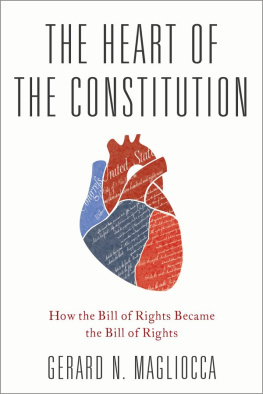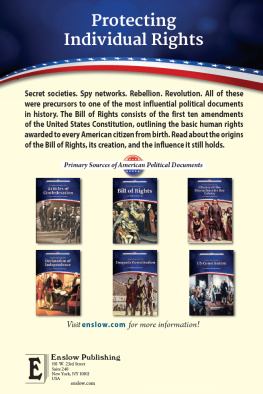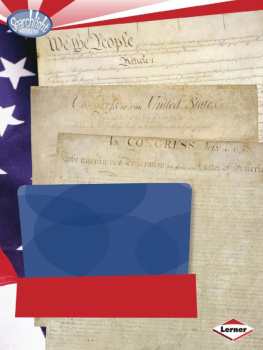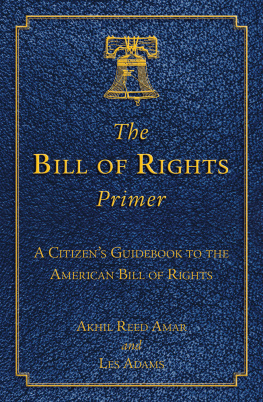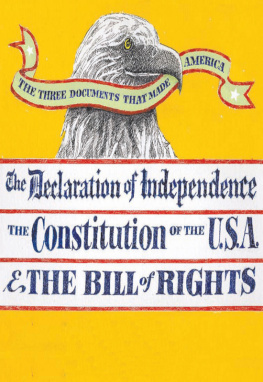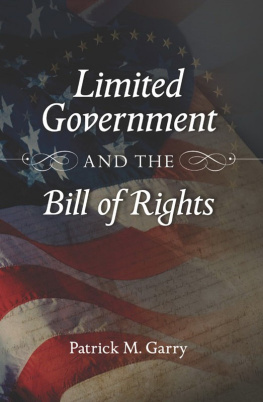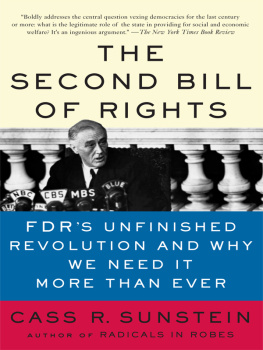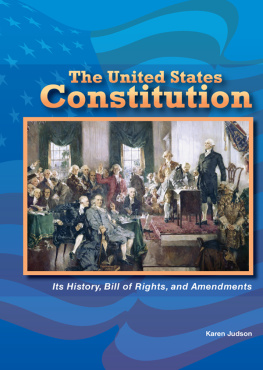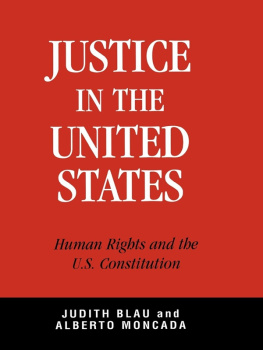Magliocca - The heart of the Constitution: how the Bill of Rights became the Bill of Rights
Here you can read online Magliocca - The heart of the Constitution: how the Bill of Rights became the Bill of Rights full text of the book (entire story) in english for free. Download pdf and epub, get meaning, cover and reviews about this ebook. City: Oxford, year: 2018;2017, publisher: Oxford University Press, genre: Business. Description of the work, (preface) as well as reviews are available. Best literature library LitArk.com created for fans of good reading and offers a wide selection of genres:
Romance novel
Science fiction
Adventure
Detective
Science
History
Home and family
Prose
Art
Politics
Computer
Non-fiction
Religion
Business
Children
Humor
Choose a favorite category and find really read worthwhile books. Enjoy immersion in the world of imagination, feel the emotions of the characters or learn something new for yourself, make an fascinating discovery.
The heart of the Constitution: how the Bill of Rights became the Bill of Rights: summary, description and annotation
We offer to read an annotation, description, summary or preface (depends on what the author of the book "The heart of the Constitution: how the Bill of Rights became the Bill of Rights" wrote himself). If you haven't found the necessary information about the book — write in the comments, we will try to find it.
Magliocca: author's other books
Who wrote The heart of the Constitution: how the Bill of Rights became the Bill of Rights? Find out the surname, the name of the author of the book and a list of all author's works by series.
The heart of the Constitution: how the Bill of Rights became the Bill of Rights — read online for free the complete book (whole text) full work
Below is the text of the book, divided by pages. System saving the place of the last page read, allows you to conveniently read the book "The heart of the Constitution: how the Bill of Rights became the Bill of Rights" online for free, without having to search again every time where you left off. Put a bookmark, and you can go to the page where you finished reading at any time.
Font size:
Interval:
Bookmark:

Oxford University Press is a department of the University of Oxford. It furthers the Universitys objective of excellence in research, scholarship, and education by publishing worldwide. Oxford is a registered trade mark of Oxford University Press in the UK and certain other countries.
Published in the United States of America by Oxford University Press
198 Madison Avenue, New York, NY 10016, United States of America.
Oxford University Press 2018
All rights reserved. No part of this publication may be reproduced, stored in a retrieval system, or transmitted, in any form or by any means, without the prior permission in writing of Oxford University Press, or as expressly permitted by law, by license, or under terms agreed with the appropriate reproduction rights organization. Inquiries concerning reproduction outside the scope of the above should be sent to the Rights Department, Oxford University Press, at the address above.
You must not circulate this work in any other form and you must impose this same condition on any acquirer.
Library of Congress Cataloging-in-Publication Data
Names: Magliocca, Gerard N., author.
Title: The heart of the Constitution : how the Bill of Rights became the Bill
of Rights / Gerard N. Magliocca.
Description: Oxford [UK] ; New York : Oxford University Press, 2018.
Identifiers: LCCN 2017015633 | ISBN 9780190271602 (hardback) |
ISBN 9780190271626 (epub)
Subjects: LCSH: United States. Constitution. 1st-10th Amendments. |
Civil rightsUnited StatesHistory | Constitutional historyUnited States. |
BISAC: LAW / Legal History. | HISTORY / General.
Classification: LCC KF4749 .M325 2018 | DDC 342.7302/9dc23
LC record available at https://lccn.loc.gov/2017015633
For Avika
Our Constitution, unlike most modern ones, does not contain a formal declaration or bill of rights.
Justice Samuel Miller, 1880
Amendment I
Congress shall make no law respecting an establishment of religion, or prohibiting the free exercise thereof; or abridging the freedom of speech, or of the press; or the right of the people peaceably to assemble, and to petition the Government for a redress of grievances.
Amendment II
A well regulated Militia, being necessary to the security of a free State, the right of the people to keep and bear Arms, shall not be infringed.
Amendment III
No Soldier shall, in time of peace be quartered in any house, without the consent of the Owner, nor in time of war, but in a manner to be prescribed by law.
Amendment IV
The right of the people to be secure in their persons, houses, papers, and effects, against unreasonable searches and seizures, shall not be violated, and no Warrants shall issue, but upon probable cause, supported by Oath or affirmation, and particularly describing the place to be searched, and the persons or things to be seized.
Amendment V
No person shall be held to answer for a capital, or otherwise infamous crime, unless on a presentment or indictment of a Grand Jury, except in cases arising in the land or naval forces, or in the Militia, when in actual service in time of War or public danger; nor shall any person be subject for the same offense to be twice put in jeopardy of life or limb; nor shall be compelled in any criminal case to be a witness against himself, nor be deprived of life, liberty, or property, without due process of law; nor shall private property be taken for public use, without just compensation.
Amendment VI
In all criminal prosecutions, the accused shall enjoy the right to a speedy and public trial, by an impartial jury of the State and district wherein the crime shall have been committed, which district shall have been previously ascertained by law, and to be informed of the nature and cause of the accusation; to be confronted with the witnesses against him; to have compulsory process for obtaining witnesses in his favor, and to have the Assistance of Counsel for his defense.
Amendment VII
In Suits at common law, where the value in controversy shall exceed twenty dollars, the right of trial by jury shall be preserved, and no fact tried by a jury, shall be otherwise reexamined in any Court of the United States, than according to the rules of the common law.
Amendment VIII
Excessive bail shall not be required, nor excessive fines imposed, nor cruel and unusual punishments inflicted.
Amendment IX
The enumeration in the Constitution, of certain rights, shall not be construed to deny or disparage others retained by the people.
Amendment X
The powers not delegated to the United States by the Constitution, nor prohibited by it to the States, are reserved to the States respectively, or to the people.
This book began in an email exchange with Pauline Maier, the celebrated American historian. In 2012, I was writing a biography of Congressman John Bingham when a colleague informed me that Professor Maier was doing research on the Bill of Rights and wanted to learn more about Binghams view of those amendments as he drafted Section One of the Fourteenth Amendment to the Constitution. Though we had never met, she was gracious when I reached out and we began corresponding. From her I learned the startling fact that the first ten constitutional amendments were not commonly described as the Bill of Rights until long after they were ratified. We mused about when the usage assumed its modern form, and curiosity got the better of me. I found Franklin D. Roosevelts forgotten speeches discussing the Bill of Rights during the New Deal and World War Two. I sent Professor Maier a draft paper summarizing my research, and she replied with thoughtful comments. Sadly, Professor Maier passed away in 2013. My first thought upon hearing the news was that it was such a shame that she would not get to follow her groundbreaking books about the Declaration of Independence and the ratification of the Constitution with one on the Bill of Rights. About a year later, I decided that I should tell that story. What you are about to read is undoubtedly different from what Professor Maier would have written, but I hope that this book lives up to the spirit of the generous scholar who inspired me.
Let me begin by thanking David McBride, Kathleen Weaver, Claire Sibley, Emma Clements, and everyone at Oxford University Press for their assistance and confidence. I am grateful to Carlo Andreani, Brian Kalt, Carlton Larson, Gerard Magliocca Sr., David Orentlicher, Tom Shakow, Rena Stoeber, Mark Tushnet, and Victoria Woeste for reading drafts and offering comments that improved the final product. A Legal History Workshop hosted by the American Bar Foundation (ABF) provided me with feedback at a crucial juncture, and thus I am indebted to everyone who attended that roundtable. The ABF workshop was on a paper that was later published in The Notre Dame Law Review, and I want to salute the student editors of Volume 92 who allowed me to use parts of The Bill of Rights as a Term of Art here and did significant work in checking my citations and quotations for accuracy. Writing any book would be impossible without the support of my faculty colleagues at the Indiana University Robert H. McKinney School of Law, who give me a terrific professional home, and the love of my wife, Preeti Sivasankar, who is at the heart of everything important to me.
Finally, this is my first book since becoming a parent. I cannot say how that experience influenced my writing, but I can say that this project will always bring back fond memories of my daughters early years. I was with her on paternity leave when I put together the outline and wrote the book as she learned to walk, talk, and think. Along the way she realized that the book would be dedicated to her and began referring to this as my book. I cannot wait for the day when Avika can read her book.
Font size:
Interval:
Bookmark:
Similar books «The heart of the Constitution: how the Bill of Rights became the Bill of Rights»
Look at similar books to The heart of the Constitution: how the Bill of Rights became the Bill of Rights. We have selected literature similar in name and meaning in the hope of providing readers with more options to find new, interesting, not yet read works.
Discussion, reviews of the book The heart of the Constitution: how the Bill of Rights became the Bill of Rights and just readers' own opinions. Leave your comments, write what you think about the work, its meaning or the main characters. Specify what exactly you liked and what you didn't like, and why you think so.

